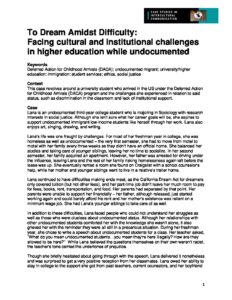To Dream Amidst Difficulty: Facing cultural and institutional challenges in higher education while undocumented
Keywords
Deferred Action for Childhood Arrivals (DACA); undocumented migrant; university/higher education; immigration; student services; ethics, social justice
Context
This case revolves around a university student who arrived in the US under the Deferred Action for Childhood Arrivals (DACA) program and the challenges she experienced in relation to said status, such as discrimination in the classroom and lack of institutional support.
Case
Lana is an undocumented third-year college student who is majoring in Sociology with research interests in social justice. Although she isn’t sure what her career goals will be, she aspires to support undocumented immigrant low-income students like herself through her work. Lana also enjoys art, singing, drawing, and writing.
Lana’s life was one fraught by challenges. For most of her freshman year in college, she was homeless as well as undocumented – the very first semester, she had to move from motel to motel with her family every three weeks as they didn’t have an official home. She balanced her studies and taking care of younger siblings, leaving her no time to socialize. In her second semester, her family acquired an apartment. However, her father was arrested for driving under the influence, leaving Lana and the rest of her family risking homelessness again left before the lease was up. She eventually rented a room she found on Craigslist with a school counselor’s help, while her mother and younger siblings went to live in a relative’s trailer home.
Lana continued to have difficulties making ends meet, as the California Dream Act for dreamers only covered tuition (but not other fees), and her part-time job didn’t leave her much room to pay for fees, books, rent, transportation, and food. Her parents had separated by that point. Her parents were unable to support her financially – her father, although released, just started working again and could barely afford his rent and her mother’s existence was reliant on a minimum wage job. She had Lana’s younger siblings to take care of as well.
In addition to these difficulties, Lana faced people who could not understand her struggles as well as those who were clueless about undocumented status. Although her relationships with other undocumented students comforted her with the knowledge she wasn’t alone, it also grieved her with the reminder they were all still in a precarious situation. During her freshman year, she chose to write a speech about undocumented students for a class. Her teacher asked, ‘’What do you mean undocumented students…you mean they’re here illegally? How are they allowed to be here?’’ While Lana believed the questions themselves on their own weren’t racist, the teacher’s tone carried the undertones of prejudice.
Though she briefly hesitated about going through with the speech, Lana delivered it nonetheless and was surprised to get a very positive reception from her classmates. Lana owed her ability to stay in college to the support she got from past teachers, current counselors, and her boyfriend as well as his family. She maintained a high GPA until the second semester of her third year, something she took great pride in.
Lana, however, did not feel either she or her fellow DACA students (or dreamers) on campus received the institutional support they needed. She remembered how the social justice centers on campus after September 5th on 2017 – a time when much of the undocumented student community was feeling great anxiety and hopelessness in relation to their ability to stay in the US – avoided holding an event or discussing the situation out of fear of looking political or biased towards any one side. To Lana, this made no sense. She believed social justice centers should do everything they could do to support undocumented students. She also believed dreamer students needed better financial support opportunities than those limited to only the most exceptional.
After getting the news, Lana decided she needed to graduate more quickly due to DACA being rescinded and her being unable being able to renew her DACA status at the time. She feared she could not receive funding for a 5th year at university as well as pay her tuition.
Discussion Questions
As you consider this case, discuss:
- What aspects of Lana’s identities would you say were salient for her in this story?
- How would you describe the internal conflicts Lana had to navigate to decide on a course of action?
- How can we prepare or educate teachers or administrators on college campuses to deal with or overcome their biases?
- What could the social justice groups at this college have done differently?
- What opportunities or resources could university campuses provide their undocumented students to assist them financially, professionally, or otherwise?
Additional Resources
Additional recommended resources to explore the central themes in this case are available.
- Suarez-Orozco, MM, et al. “In the Shadows of the Ivory Tower: Undocumented Undergraduates and the Liminal State of Immigration Reform.” EScholarship, University of California, 12 Mar. 2015.
- Munoz, Susana & Vigil, Darsella. (2018). ‘’Interrogating Racist Nativist Microaggressions and Campus Climate: How Undocumented and DACA College Students Experience Institutional Legal Violence in Colorado.’’ Journal of Diversity in Higher Education, May 2018.
- TEDx Talks. “The Dreamer’s Dream | Uriel Casas | TEDxJMU.” YouTube, 15 May 2018.
- American Immigration Council, DACA.
Corresponding Author
Huq, Samin, American University, Washington, DC USA. Email: sh0278a@student.american.edu


